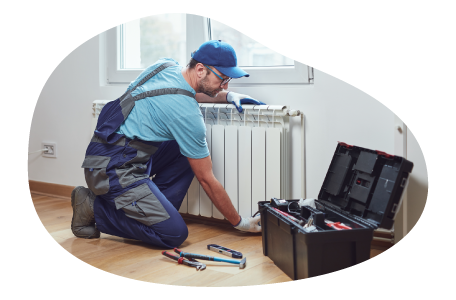
Find insurance for handyman contractors in Illinois
Learn about license requirements and the most common handyman insurance policies in Illinois.

Get the right coverage
Insureon helps handyman contractors compare insurance quotes from top-rated U.S. providers.
Get free expert advice and peace of mind knowing you have the right types of coverage for your unique risks.
What are the most common policies for handymen in Illinois?
Handyman contractors may need different types of insurance coverage depending on the work they do. These are the most popular insurance policies for Illinois contractors to protect against financial losses.
General liability insurance
A general liability policy covers basic risks, such as accidental damage to a client's sink. Bundle with commercial property insurance for savings in a business owner’s policy (BOP).
- Customer bodily injuries
- Customer property damage
- Advertising injuries
Business owner's policy
A BOP bundles general liability coverage and commercial property insurance at a discount. It's often the most cost-effective type of insurance for handyman businesses.
- Accidents that injure clients
- Client property damage
- Damage to your building or its contents
Workers’ compensation insurance
Most states require workers’ comp for handyman businesses that have employees. It also protects sole proprietors from job-related medical costs that health insurance might deny.
- Employee medical expenses
- Disability benefits
- Lawsuits from work-related injuries
Commercial auto insurance
A commercial auto policy covers third-party bodily injuries and property damage in accidents involving work vehicles. It can also cover vehicle theft and vandalism.
- Auto accident lawsuits
- Physical damage and collision coverage
- State requirements for auto liability coverage
Contractor’s tools and equipment insurance
This type of contractor insurance helps pay for repair or replacement of a handyperson's hammers, saws, drills, wrenches, and other tools if they are lost, stolen, or damaged.
- Tools less than five years old
- Equipment valued at less than $10,000
- Items brought to jobsites
Professional liability insurance
Professional liability insurance covers legal fees when a handyman is sued for a mistake or oversight. It's also called errors and omissions insurance (E&O).
- Accusations of negligence
- Failure to finish a project on time
- Undelivered services
Surety bonds
A surety bond is an agreement between a handyman contractor, a client, and an insurance company. It guarantees the insurer will reimburse the client if the contractor fails to fulfill their contract.
- Project delays
- Loss of key staff
- Failure to obtain materials
Builder's risk insurance
Builder's risk insurance covers a structure in progress and materials at a construction site. It's sometimes called course of construction insurance.
- Fires
- Storms
- Theft of materials
Contractors pollution liability insurance
Pollution liability insurance can help pay for legal defense costs related to particulates or other pollution that came from your worksite. It's sometimes called environmental insurance.
- Accidental spills
- Cleanup costs
- Pollution lawsuits
Which policies are required for a handyman in Illinois?
General liability insurance
While there isn't a state-wide requirement, some handyman contractors in Illinois are required to carry general liability insurance and obtain a license through their city of operation, depending on the type of work they do.
General liability insurance protects your business from legal expenses stemming from common mishaps, such as customer bodily injuries and property damage. And some homeowners may request proof of coverage before signing a contract with you.
Most commercial leases require businesses to carry this coverage. Adding commercial umbrella insurance can boost your coverage on general liability insurance and other types of liability insurance.
Contractor general liability insurance can also help protect against advertising injuries, such as libel, slander, and copyright infringement. For example, it will pay for your legal defense costs if a competitor sues your business for making a false statement about them on social media.
Workers' compensation insurance
To meet state requirements, handyman businesses with any employees must provide workers’ compensation insurance, which covers medical bills and disability benefits for work injuries.
Some independent contractors and sole proprietors may choose to carry workers' compensation if they do not have any employees. This is because personal health insurance doesn't usually cover work-related injuries and illnesses.
Workers' comp insurance also typically includes employer's liability insurance, which helps pay for workplace injury lawsuits.
Commercial auto insurance
Commercial auto insurance covers property damage and medical bills resulting from an accident involving your handyman business's vehicle. Depending on the coverage options you choose, it can also pay for vehicle theft, weather damage, and vandalism.
Minimum auto liability requirements for Illinois businesses are:
- $25,000 per person bodily injury liability
- $50,000 per accident bodily injury liability
- $20,000 per accident property damage liability
- $25,000 per person uninsured motorist coverage
- $50,000 per accident uninsured motorist coverage
For vehicles that are used by the business but are leased, rented, or otherwise not owned by the company, you'll need a separate policy called hired and non-owned auto insurance (HNOA). This policy provides liability insurance, but it does not cover damage to the insured vehicle.
Personal auto insurance will typically not cover any driving for business purposes, which is why you may need supplemental coverage.
Surety bonds
Licensure requirements in Illinois sometimes include a surety bond, depending on the type of work you do.
A surety bond guarantees reimbursement for the client if a handyman fails to fulfill the terms of a contract or adhere to regulations. Common types of surety bonds include bid bonds, performance bonds, and payment bonds.

Do I need a license to be a handyman in Illinois?
There’s no statewide handyman or contractor license requirement in Illinois. However, several cities and local jurisdictions have their own rules.
For example, Chicago requires general contractors to hold a city-issued license. There are five different classes of licenses, based on the type of work and the project value. Each license has its own insurance requirements (primary or umbrella):
- Class A general contractor: $5 million per occurrence and an unlimited project value
- Class B general contractor: $3 million per occurrence and a $10 million project value
- Class C general contractor: $1 million per occurrence, $2 million aggregate, and a $5 million project value
- Class D general contractor: $1 million per occurrence, $2 million aggregate, and a $2 million project value
- Class E general contractor: $3 million per occurrence and a $500,000 project value
Other cities also have licensing rules. In Aurora and Joliet, contractors need to apply for certain licenses before performing work. These requirements can vary depending on the project, so it’s important to check with your local city or county office to make sure you’re compliant.
You'll likely need to take an exam, have a certain amount of experience, pass a background check, and pay a fee. How much you'll pay for the fee depends on whether or not you are the sole owner of the business. Your insurance premiums also vary depending on the type of work you do, whether you have employees, and other factors.
How much does handyman insurance cost in Illinois?

Illinois handyman contractors who buy policies from Insureon pay an average of:
General liability: $67 per month
Workers' compensation: $138 per month
Commercial auto: $185 per month
Several factors affect the cost of handyman insurance, including:
- Handyman services you provide, such as painting or carpentry
- Business property and equipment
- Business income and size
- Years of experience
- Policy limits and deductibles
- Claims history
Verified business insurance reviews
Hear from customers like you who purchased small business insurance.
How do I get Illinois handyman insurance?
Insureon helps you save time and money shopping for handyman liability insurance by comparing quotes from top U.S. insurance companies.
Our insurance agents are licensed in Illinois and can answer your questions as you consider coverage.
To make the application go quicker, have this information ready:
- Workforce details, such as the number of employees and subcontractors
- Current and projected revenue
- Business partnerships
- Desired coverage limits
- Claims history
- Commercial lease insurance requirements
Apply for free insurance quotes today to find cheap handyman insurance that fits your business needs. Most small business owners receive a certificate of insurance (COI) for proof of insurance the same day.
